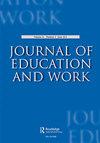反工作、TVET和雇主参与
IF 1.7
Q2 EDUCATION & EDUCATIONAL RESEARCH
引用次数: 2
摘要
本文汇集了左翼的一系列辩论,以解决当前背景下TVET的未来。这些争论的核心在于两个问题。第一部分讨论了资本的对立观点,第二部分关注资本和工人利益之间的矛盾。这篇论文认为,资本并非全部,证明人类繁荣的体面工作并非完全未知。然而,与其他形式的有偿劳动一样,这种工作是建立在资本主义关系和利益的基础上的,重要的是不要忽视作为斗争和争论场所的有偿劳动。因此,当环境因新技术的发展而改变时,这本身就是一个社会过程,或者当权力的平衡向有利于资本的方向转移时,这种劳动可能会被抛弃,或者变得如此缺乏技能,以至于几乎认不出来。本文的结构如下。最初的部分讲述了论文的起源,讨论了企业社会责任和反工作,使人们能够接触到不同的资本概念。随后的“限制性学习与扩张性学习”和“职业技术教育与职业教育的思考”部分主要关注工人与资本的利益冲突。本文以TVET的讨论结束,并考虑了对当前条件的反应,这些条件需要参与早期的成人和社区教育传统。本文章由计算机程序翻译,如有差异,请以英文原文为准。
Anti-work, TVET and employer engagement
ABSTRACT The paper brings together a range of debates on the left that address TVET’s future in current context. At the heart of these debates rest two issues. The first addresses competing views of capital and the second focuses on the contradiction between the interests of capital and workers. The paper argues that capital is not all of a piece and that decent work that validates human flourishing is not completely unknown. However, as with other forms of waged labour, such work is predicated on capitalist relations and interests and it is important not to overlook waged labour as a site of struggle and contestation. Consequently, when circumstances alter as a result of the development of new technology, itself is a social process, or when the balance of power shifts in favour of capital, such labour may be dispensed with or become so deskilled that it is hardly recognisable. The paper is structured in the following way. The initial sections address the paper’s genesis, a discussion of corporate social responsibility and anti-work that enables an engagement with differing conceptualisations of capital. The subsequent sections, Restrictive and Expansive Learning and Thinking about TVET focus on the contradictory interests of workers and capital. The paper closes with a discussion of TVET and considers responses to current conditions that necessitate an engagement with an earlier tradition of adult and community education.
求助全文
通过发布文献求助,成功后即可免费获取论文全文。
去求助
来源期刊

Journal of Education and Work
EDUCATION & EDUCATIONAL RESEARCH-
CiteScore
2.70
自引率
14.30%
发文量
40
期刊介绍:
The Journal of Education and Work is an international forum for academic research and policy analysis which focuses on the interplay of the education and economic systems. The journal examines how knowledge, skills, values and attitudes both about and for work and employment are developed within the education system. The journal also explores the various forms of industrial training and accreditation in the economic system, including changes in the economic and industrial infrastructure which influence the type of employees required. Work in the informal economy is also included.
 求助内容:
求助内容: 应助结果提醒方式:
应助结果提醒方式:


